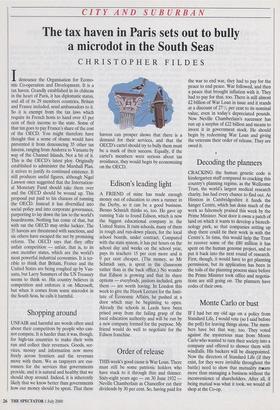CITY AND SUBURBAN
The tax haven in Paris sets out to bully a microdot in the South Seas
CHRISTOPHER FILDES
Idenounce the Organisation for Econo- mic Co-operation and Development. It is a tax haven. Grandly established in its château in the heart of Paris, it has diplomatic status, and all of its 29 members countries, Britain and France included, send ambassadors to it. So it is exempt from the tax laws which require its French hosts to hand over 43 per cent of their income to the state. Some of that tax goes to pay France's share of the cost of the OECD. You might therefore have thought that a sense of shame would have prevented it from denouncing 35 other tax havens, ranging from Andorra to Vanuatu by way of the Channel Islands. Not a bit of it. This is the OECD's latest ploy. Originally established to administer the Marshall Plan, it strives to justify its continued existence. It still produces useful figures, although Nigel Lawson once suggested that the Internation- al Monetary Fund should take them over and the OECD should be wound up. This proposal put paid to his chances of running the OECD. Instead it has diversified into social policy and into corporate governance, purporting to lay down the law to the world's boardrooms. Nothing has come of that, but with tax the OECD may strike luckier. The 35 havens are threatened with sanctions, and six others have escaped the net by promising reform. The OECD says that they offer unfair competition — unfair, that is, to its own member states, which are the world's most powerful industrial economies. It is ter- rible to think that Britain, France and the United States are being roughed up by Van- uatu, but Larry Summers of the US Treasury seems to think so. His country believes in competition and enforces it on Microsoft, but when it comes from some microdot in the South Seas, he calls it harmful.


























































 Previous page
Previous page